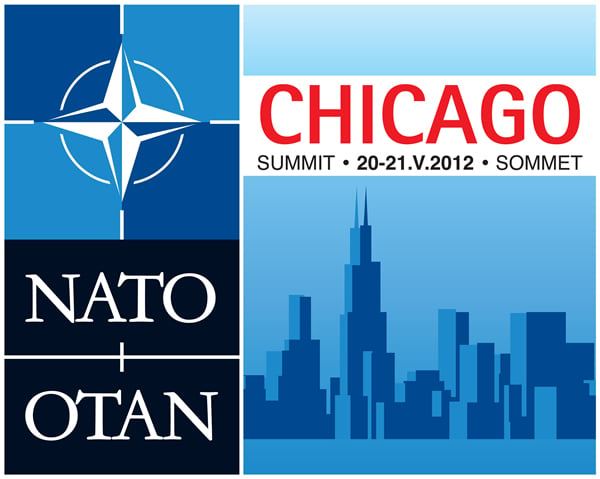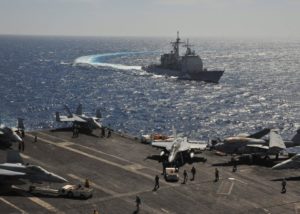
The countdown is on. In three days, Chicago will be hosting the 2012 NATO summit from May 20th to 21st. New figures will be traveling to Chicago, among them the newly elected French President François Hollande. Prior to the beginning of the Summit, this piece will outline one of the most important threats that NATO leaders should address.
No threat is greater than the impact of the current financial crisis and its impacts on national economies on the Euro-Atlantic community. The financial crisis is an unconventional and overlooked menace in a pure military term; nevertheless, during the last two years it has been framed by policy-makers and politicians across the Atlantic as a ‘real threat.’ The debate on foreign policy between GOP candidates back in November made this point quite clearly. Candidates were framing the crisis on the same level than any other military threats. The financial and Euro crises have considerably affected the behaviors in foreign policy and defense of the members of the Euro-Atlantic community, as well as their abilities to react to emerging political and foreign policy crises.
 The collapse of the financial markets in September 2008 led to a series of austerity measures undertaken by the members of the Euro-Atlantic community. Considerable cuts have already been implemented in Britain, the US, and possibly to come in France in their defense and foreign policy programs, which will have considerable impacts in the short term, but even greater consequences on the long-run. For example, the significant measures effectuated by Downing Street raised concerns and criticisms by many members of the British government and armed forces concerning the lack of strategy employed. These cuts will not only affect the abilities of the members of the Euro-Atlantic community to project their hard power in time of crisis, but also could undermine their soft power in years to come. With the current shift in the balance of power, new threats– cybersecurity, environmental/energy – are emerging, old ones – terrorism, failed states, nuclear proliferation – remaining, and new powers rising. In this critical juncture the members of the Euro-Atlantic community need to find a balance between adjusting their defense programs in accordance with their economic and geopolitical realities and securing enough power and capabilities in order to maintain and project their power in the coming decades.
The collapse of the financial markets in September 2008 led to a series of austerity measures undertaken by the members of the Euro-Atlantic community. Considerable cuts have already been implemented in Britain, the US, and possibly to come in France in their defense and foreign policy programs, which will have considerable impacts in the short term, but even greater consequences on the long-run. For example, the significant measures effectuated by Downing Street raised concerns and criticisms by many members of the British government and armed forces concerning the lack of strategy employed. These cuts will not only affect the abilities of the members of the Euro-Atlantic community to project their hard power in time of crisis, but also could undermine their soft power in years to come. With the current shift in the balance of power, new threats– cybersecurity, environmental/energy – are emerging, old ones – terrorism, failed states, nuclear proliferation – remaining, and new powers rising. In this critical juncture the members of the Euro-Atlantic community need to find a balance between adjusting their defense programs in accordance with their economic and geopolitical realities and securing enough power and capabilities in order to maintain and project their power in the coming decades.
Interestingly, since 2008 a new trend has emerged with the development of short-term bilateral cooperation – mainly between France and Britain – under NATO auspices. The platform of NATO offers access to US capabilities and leadership that Europeans lack. The case of the 2011 Libya war illustrates this new trend of multilateral military actions orchestrated by the members of the Euro-Atlantic community bypassing EU structures. Europeans are increasingly becoming unable and unwilling to launch purely EU-led missions in strategic regions due to high political, military, and economic risks. The latest signs – for example the wars in Afghanistan and Libya, and the naval mission off the coast of Somalia – have shown that NATO will become more active in order to promote the interests of Paris and London with the backing of Washington. With the recent transformations in the Mediterranean region starting with the Arab Spring, NATO could be an appropriate platform for discussing and monitoring the political, societal, and military changes.
 How should the leaders address this challenge? The answer can be found in the virtuous circle of the ‘three Cs:’ cooperation, coordination, and compliance. Cooperation is an important starting point. In order to deepen the degree of cooperation, platforms such as NATO, G8-G20 will need to be strengthened and offer alternatives to individual actions. Thus cooperation would offer a better strategy for burden-sharing in defense and military operations and lower the financial burden of individual military action. With lasting economic hardships, a better coordination between the members of the Euro-Atlantic community is critical. Coordination cannot take place without cooperation considering the need for fostering trust, even among historical partners. Coordination, which includes exchange of information and capabilities, will increase the degree of communication and avoid duplicated efforts without affecting states’ power. Last but not least, compliance is central. Members’ compliance will take place at two levels: first, in international fora; second, at the domestic level. Members of the Community must be able to implement the promises made at the international level domestically. The integration of these commitments made by the heads of state and government need to be included in the domestic body of laws as well as in the close military circles. This element of domestic enforcement is central in order to make members accountable for their commitments to the sharing of information and capabilities, as well as fostering cooperation. These three Cs therefore form a virtuous circle, wherein each iteration of the circle reinforces the previous one.
How should the leaders address this challenge? The answer can be found in the virtuous circle of the ‘three Cs:’ cooperation, coordination, and compliance. Cooperation is an important starting point. In order to deepen the degree of cooperation, platforms such as NATO, G8-G20 will need to be strengthened and offer alternatives to individual actions. Thus cooperation would offer a better strategy for burden-sharing in defense and military operations and lower the financial burden of individual military action. With lasting economic hardships, a better coordination between the members of the Euro-Atlantic community is critical. Coordination cannot take place without cooperation considering the need for fostering trust, even among historical partners. Coordination, which includes exchange of information and capabilities, will increase the degree of communication and avoid duplicated efforts without affecting states’ power. Last but not least, compliance is central. Members’ compliance will take place at two levels: first, in international fora; second, at the domestic level. Members of the Community must be able to implement the promises made at the international level domestically. The integration of these commitments made by the heads of state and government need to be included in the domestic body of laws as well as in the close military circles. This element of domestic enforcement is central in order to make members accountable for their commitments to the sharing of information and capabilities, as well as fostering cooperation. These three Cs therefore form a virtuous circle, wherein each iteration of the circle reinforces the previous one.
The concept of ‘smart defense’ adopted at the 2010 Lisbon Summit is a good starting point, but it needs to be incorporated and developed along the triple C guidelines. Back in February 2012, one of the largest virtual discussions took place in order to discuss new, old, and emerging threats. One of the core fora was the one on the international cooperation in capabilities discussing the future of the smart defense and its European variant ‘Pooling & Sharing.’ At the end of the day even though one of the main factors in bolstering cooperation comports a strong economic incentive, the driving force remains political.
Reference:
1) Banners along LaSalle St. (Antonio Perez/Chicago Tribune)